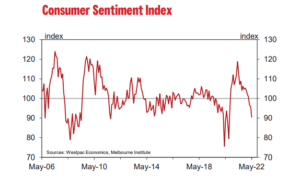News
What’s going on with inflation and interest rates?
July 21, 2022
It feels like a continuing procession of punches; bushfires, COVID, floods, a war in Europe, and now households and businesses alike face skyrocketing inflation and interest rates, cost blowouts and even mortgage/rent stress for some. And it seems to have hit us all of a sudden……
Inflation is the key, and it helps to recognise the link.
In short, inflation is caused by productivity/supply/demand factors; it drives our costs up and the only weapon the Reserve Bank has to control inflation is to cool activity by increasing interest rates. This is okay in principle when it is exercised in a calm and orderly manner but the problem now is that it has all come on much faster than anticipated.
Why so sudden and so big?
Inflation has roared upwards and that’s what starts the ball rolling. The Reserve Bank’s aim is to keep inflation between 2% and 3% in order to maintain a healthy economy. For much of the past 10 years, inflation has been in the vicinity of 1%, barely peeking over 2% on the odd occasion. In late 2021 it started to creep into the 3%’s and in 2022 so far it has jumped from 3.5% to over 5%. There’s some more pain to come in the short term as the RBA has tipped it to peak at 7% before easing in 2023.
The interest rate response has been commensurately sharp.
With our official interest rate sitting at 0.10% at the start of 2022 it was no surprise to anybody that interest rates would rise at some point, but this was not expected to begin until 2023 or 2024.
With the global events mentioned above unfolding in such quick succession a few months ago it became very apparent, very quickly, that not only was inflation here to stay but it had all come on much bigger and much faster than most observers expected.
What does it mean for Strata building budgets?
At the personal level, we’ve all started to see the impacts of rising inflation – petrol and grocery prices are stand-outs. Mortgage rates have gone up and rental rates are on the way up too.
Owners in Strata properties have their own special considerations as well, in the form of body corporate levies. Whether you’re on a Body Corporate Committee charged with preparing the upcoming body corporate budget or sitting in your nice apartment pondering your own personal budget – a decent chunk of which will go to your body corporate levy – it will be important to plan ahead.
While a modest allowance for increased costs is standard practice it can be tricky in times of rapid inflation. Amplified by staff shortages and a record low unemployment rate it is difficult to identify the magnitude of wages costs and to adequately and appropriately provide for sinking funds. External administrative and consulting costs are all subject to increase, and a special surprise may be in a store where agreements are in place (caretaker agreements for example) that provide for an annual cost increase based on CPI (Consumer Price Index, aka ‘inflation’) rather than a fixed rate each year.
Where are we heading?
On the positive side, the Reserve Bank expects inflation to ease off in 2023 and settle back at a more sustainable long-term level within its target range. The idea of raising interest rates is to dampen activity and there are early signs that this is already kicking in though it takes quite a while to filter through the system. More interest rate rises will certainly follow until an appropriate balancing point is reached.
Consumer sentiment plays a very important part, and it is widely held that the mere prospect of significantly higher rates in the future will influence consumer behaviour instantly and this will help to address some parts of the inflation problem almost immediately. This remains to be seen because it is also true that a lot of the inflationary pressure is due to supply issues as much as consumer demand, and these could take some time to catch up.
But certainly, the current state of things has led to a drop-off in consumer confidence as the chart below shows. It is interesting also to note the other two most recent periods of extremely low confidence – when Covid struck in early 2020, and further back in 2008 when the GFC hit.

There are two sides to every coin.
It will help us all to remember that the return of interest rates to more ‘normal’ levels will also bring some benefits once this initial period of transitory shock settles.
The frenzy will come out of housing prices and, especially for retirees and corporate groups such as councils or, in our case, Body Corporates, the lower risk ‘fixed income’ investments such as term deposits and Government/Corporate Bonds will bring decent returns in that 3%-5% range once again. We haven’t seen that for quite a few years.
This article has been contributed by Scott Quinlan, Principal of Solace Financial
The post What’s going on with inflation and interest rates? appeared first on Smart Strata | Body Corporate Management.
